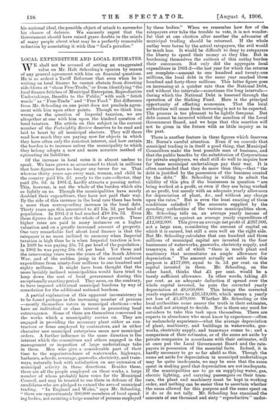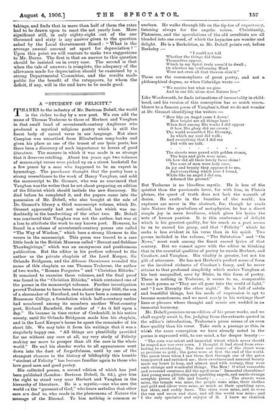LOCAL EXPENDITURE AND LOCAL ESTIMATES.
WE shall not be accused of setting an exaggerated value on Mr. Holt Schooling's opinion by reason of any general agreement with him on financial questions. He is so ardent a Tariff Reformer that even when he is writing on local finance he cannot abstain from directing side-blows at "sham Free-Trade," or from identifying "the local finance fetiches of Municipal Enterprise, Reproductive Undertakings, Benefits to the Public," with such "fetich words" as " Free-Trade " and "Free Food." But difference from Mr. Schooling on one point does not preclude agree- ment with him upon other points. Though we think him wrong on the question of Imperial taxation, we are altogether at one with him upon the kindred question of local taxation. His article on this subject in the current number of the Fortnightly Review deserves to be read and laid to heart by all municipal electors. They will there read how much they are paying now for objects in which they have often only the remotest interest, and how certain the burden is to increase unless the municipality to which they belong adopts a new and more accurate method of e:timating its liabilities.
Of the increase in local rates it is almost useless to speak. We have grown so accustomed to think in millions that bare figures have no longer any terror for us. That whereas thirty years ago every man, woman, and child in the country paid 16s. 2d. yearly to the rate-collector, they paid 28s. 6d. in 1901-2, hardly attracts a passing notice. This, however, is not the whole of the burden which sits so lightly on us. Though the municipalities have nearly doubled their expenditure, they have not paid their way. By the side of this increase in the local rate there has been a more than corresponding increase in the local debt. Thirty years ago this amounted to £3 15s. 3d. per head of population. In 1901-2 it had reached £10 10s. 7d. Even these figures do not show the whole of the growth. These higher rates are paid in many instances on a higher valuation and on a greatly increased amount of property. One very remarkable fact about local finance is that the ratepayer is no more inclined to economy when Imperial taxation is high than he is when Imperial taxation is low. In 1899 he was paying 25s. 7d. per head of the population ; in 1902 he was paying 28s. 6d. per bead. Yet, these and the intervening years were the years of the South African War, and of the sudden jump in the annual national expenditure from ninety-four millions to one hundred and eighty millions. It might have been thought that the more lavishly inclined municipalities would have tried to keep down the cost of local government during this exceptionally exacting period. They seem, on the contrary, to have imposed additional municipal burdens by way of consolation for the additional national burdens.
A partial explanation of this apparent inconsistency is to be found perhaps in the increasing number of persons —mostly themselves voters in municipal elections—who have an individual or class interest in promoting local extravagance. Some of them are themselves concerned in the works which a, municipality carries on. They are engaged in providing the necessary plant either as con- tractors or firms employed by contractors, and in either character new municipal enterprises mean new municipal orders. A further influence in the same direction is the interest which the committees and others engaged in the management or inspection of large undertakings take in them. Men who give a considerable part of their time to the superintendence of waterworks, highways, harbours, schools, sewerage, gasworks, electricity, and tram- ways, naturally look with satisfaction on any extension of municipal activity in these directions. Besides these, there are all the people employed on these works, a large number of whom probably have votes for the Municipal Council, and may be trusted to use them in defence of the candidates who are pledged to extend the area of municipal trading. "In England and Wales," says Mr. Schooling, "there are approximately 300,000 members of local spend- ing bodies, not counting a large number of persons employed. by these bodies." When we remember how few of the ratepayers ever take the trouble to vote, it is not wonder- ful that at one election after another the advocates of municipal trading should be returned. If the whole outlay were borne by the actual ratepayers, the evil would be much less. It would be difficult to deny to ratepayers the liberty to spend their money as they like. But in burdening themselves the authors of this outlay burden their successors. Not only did the aggregate local expenditure in 1901-2—the last year for which the returns are complete—amount to one hundred and twenty-one millions, the local debt in the same year reached three hundred and forty-three millions. This latter figure goes on increasing at a quicker rate than the National Debt, and without the intervals—sometimes the long intervals— during which the National Debt is lessened through the operation of the Sinking Fund. Here is the principal opportunity of effecting economies. That the local authorities will cease from borrowing is not to be expected. The process is too pleasant to be lightly foregone. But debt cannot be incurred without the sanction of the Local Government Board, and we hope that this sanction will not be given in the future with as little inquiry as in the past.
There is another feature in these figures which deserves Mr. Burns's careful attention. Even if we concede that municipal trading is in itself a good thing, that Municipal Councillors make the best possible men of business, and. that the public benefits by the substitution of Corporations for private employers, we shall still do well to inquire how far these municipal undertakings pay their way. It is often contended that they do more than this,—that " the debt is justified by the possession of the business created by the debt." Mr. Schooling is willing to admit the validity of this plea if the businesses in question "are being worked at a profit, or even if they are being worked at no profit, but merely with an adequate yearly allowance for depreciation of plant, &c., and without any charge upon the rates." But is even the least exacting of these conditions satisfied ? The accounts supplied by the spending authorities of the various municipalities show, Mr. Schooling tells us, an average yearly income of £13,049,000, as against an average yearly expenditure of £12,662,000. This gives an average net profit of £387,000, not a large sum, considering the amount of capital on which it is earned, but still a sum well on the right side. But Mr. Schooling calculates that one hundred and three millions of municipal capital are invested in the four businesses of waterworks, gasworks, electricity supply, and tramways, in all of which "there is much plant and. machinery that necessitates an ample allowance for depreciation." The amount actually set aside for this purpose is £177,000, equal to 3s. 5d. per cent, on the capital invested in them. Mr. Schooling, on the other hand, thinks that ,R5 per cent, would be a barely sufficient allowance. In other words, taking £5 per cent, as an adequate deduction if spread over the whole capital invested, he puts the corrected yearly depreciation at £6,050,000. This brings the correctecl. yearly expenditure to £18,519,000, which means a yearly net loss of £5,479,000. Whether Mr. Schooling or the local authorities come nearer the truth in their estimates, we shall not attempt to decide. Nor is there any need for outsiders to take this task upon themselves. There are experts in abundance who must know by experience—often by melancholy experience—what the average depreciation of plant, machinery, and buildings in waterworks, gas- works, electricity supply, and tramways comes to ; and a comparison of their estimates, or of the sums set aside by private companies in accordance with their estimates, will at once put the Local Government Board and the rate- payers in possession of the essential facts. Indeed, it is hardly necessary to go so far afield as this. Though the sums set aside for depreciation in municipal undertakings may be quite inadequate, we may be sure that the sums spent in making good that depreciation are not inadequate. If the municipalities are to go on supplying water, gas, electric lighting, and carrying passengers on their tram- cars, the plant and machinery must be kept in working order, and nothing can be easier than to ascertain whether the sums allowed for this purpose and the sums spent on it do or do not tally. Mr. Schooling has examined the accounts of one thousand and sixty " reproductive " under- takings, and finds that in more than half of them the rates had to he drawn upon to meet the net yearly loss. More significant still, in only eighty-eight out of the one thousand and sixty is any answer given to the question asked by the Local Government Board : "What is the average annual amount set apart for depreciation ? " Upon this point we will venture to make two suggestions to Mr. Burns. The first is that an answer to this question should be insisted on in every case. The second is that when the tale of answers is complete, the adequacy of the allowance made for depreciation should be examined by a strong Departmental Committee, and the results made public for the benefit of the ratepayers, by whom the deficit, if any, will in the end have to be made good.







































 Previous page
Previous page